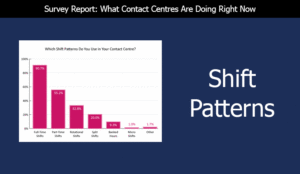Bidding for Shifts
Hello,
We are going ahead with utilizing a Shift Bidding process whereas CSE will be bidding for shifts based on their performance and experience criteria. I would like to know Pro’s and Con’s of this process.
Question asked by Rachana
Bidding for Shifts
Incentive schemes are used in business to affect the way that Employees behave.
If we want more productivity we make an incentive, to reduce absenteeism we make an incentive, to increase sales, we make an incentive.
But in each case we only truly succeed in improving performance if we generate a change in behaviour that sustains the change in performance in the long term and to do this the work force must become involved.
In order to become involved there has to be something in it for them.
Nobody will change their behaviour unless they experience a ‘Win’ when they make a change.
The incentive and bonus schemes appear to work well in the short term.
The reward however soon becomes an expectation and loses its power to act as an incentive.
We humans as a species are fiendishly adept at defeating these engineered solutions with strategies that will allow us to continue to gather the reward without changing our behaviour.
The reward that cannot be bought costs nothing.
In short I believe your strategy is flawed and will only result in short term gain.
With thanks to Closed
Bidding for Shifts
This is an approach used over the pond in the US.
The best performers get to pick the best shifts, however, only really works if there is little if any financial incentive to work the poor shifts.
Also used for holiday allocation whereby best performers get first pick.
Needs to be a level playing field with all agents able to “win” the best shifts and some form of handicap so that the more experienced staff dont just get the best shifts by default.
Doesn’t work in the UK because we dont share this culture (yet) – we tend to see length of service or first come first serve.
With thanks to Julian
Not All Shifts Are Equal
Doesn’t this all really depend on how you define performance? A subject all too often affected by extraneous issues – I have no idea how performance is measured in this instance or if we are dealing with I/B O/B sales or what. However there are many factors outside an agents control that influence performance including process and systems, quality of leads, reliability of dialler, quality of managers, culture, motivational factors notwithstanding the fact that attendance may also form part of a performance measure.
We all know that sales rates differ according to time of day you are calling at.
I would have thought that the biggest issue is that those who perform well get to choose the ‘best shifts’ ie. those shifts where there is a higher propensity to sell, relegating the weaker performers to lower rated shifts thereby condemning them to vicious circle very difficult to pull themselves out of.
In the UK I wonder how this would play out given the recent issues surrounding (‘in’)flexible working.
With thanks to Closed
Self Rostering
Hi All,
Self-rostering by agents has been around for a long time and so have the arguments for/against it. Views on the most effective method of implementing it have been equally contentious. I think that there are a number of points to consider:
1. Bidding can be a tricky process to get right. An incentive to only the top performers may perpetuate their success at the detriment of other agents and possibly your customers. Once an agent has accumulated the ‘credits’ necessary to pick the ‘best’ shifts the poor performers may find it difficult to improve sufficiently to topple them. A clear division is never good for business or morale. In this instance the consistency of caller experience may also suffer – for example, a caller speaks to a highly motivated agent on one call and a depressed agent on the next call.
2. Most WFM systems tend to adopt either a bidding or preference based approach to self-rostering. Either can work but it will vary from business to business as to which is the most effective. In recent years there has been a trend towards preference based rostering in recognition of the need to accommodate ‘lifestyle scheduling’. This is basically the view that everyone is unique and should be treated accordingly. This in turn highlights another question that covered – how is a good or bad shift actually defined? Because each agent has a different set of circumstances inside and outside of work, their view on what is a ‘good’ or ‘bad’ shift will also be different. Children, family commitments, hobbies and interests all play an important part. Because of this individuality it is a fact that your agents will not universally agree on the definition of a good or bad shift. This in itself causes issues when attempting to implement a bidding process – you will always risk alienating and losing those that do not have the ‘traditional’ view on which shifts are good and those that are bad.
3. Whilst a universal agreement on what constitutes a good/bad shift is rare, the variance in this perception is influenced by the number of different employment contracts that you have – e.g. full-time v’s part-time, flexi v’s fixed, team based or block scheduling…and so on. In fact, flexibility in staff contracts is a key factor in determining the success of self-rostering solutions altogether (preference or bidding). The fewer the options available to agents the more likely it is that they will be split into two camps – good v’s bad shifts. The greater the selection of shifts, the more an agent will be able to pick options that suit their lifestyle and do not cause conflict. If there is sufficient choice to allow agents to influence how and when they work this will naturally have a positive impact on morale.
4. The ability to self roster should apply to all and not just a few top performers. It is possible to allow each agent to feel that they have the ability to influence/determine when they work but within parameters that ensures service levels are maintained. It’s certainly not easy, but there are quite a few that have managed it.
In summary, if you are able to define what constitutes a ‘good’ and ‘bad’ shift from both a business and individual agent perspective then you are already one step ahead of most contact centres. The fewer rules and restrictions that are in place regarding shift patterns the more likely that self-rostering will work. If you use a bidding or preference based system you should aim to balance individuality with a consistent service.
With thanks to Steven
Bidding for Shifts
As I said we are planning to implement the shift bidding, but it will be only for few % of senior and efficient people. In the begining we planning to offer this to only 30% of total staff, also along with the same we are planning to have different working hours in a day and no. of days in week ie 9 hours shift for 5 days a week and 7 hours shift for 6 days a week. Again it will be implemented to 40% of total staff.
And that is the reason why we want to know the impact of each.
With thanks to Rachana
Bidding for Shifts
Good Afternoon Rachana,
How do you measure an efficient staff member? Also what are the measurements to identify an experienced staff member? It is conceivable that whatever measurements are put in place there will be individuals who work out how to manipulate this to their advantage.
Why not recruit to the specific shift patterns, although it may take longer to fill your requirements this would positively impact on your staff retention if they are working what they consider their preferred shift.
With thanks to Colin
Why not recruit to the specific shift patterns?
Why not recruit to the specific shift patterns
I can hire 50 people and everyone agrees they are available “24/7” yet as soon as a schedule comes out I would have 20 people knocking on my door indicating they can’t work those shifts (not to mention 10 that quit).
Peoples requirements also change around their personal life and other obligations.
maybe I have always worked in enviroments that have implemented this but I am having some trouble….
Why would you NOT use this system? What is the advantage over just making people work whenever you want rather than trying to accomodate them based on performance?
With thanks to Justin
Why Not
Well on a personal basis (and in my own opinion).
This is going to lead to resentment as some staff are seen to be privileged and the underlying trend will be….
“We are being penalised with crap shifts because we’re not in the top x%”.
Rather than, “Good I hit my target I can pick the shifts I want to work.”
It’s always been said.”Never appeal to a mans better nature, appeal to his
self interest instead. Most don’t have a better nature” [1]
[1] Well the actual quote is Never appeal to a man’s “better nature.” He may not have one. Invoking his self-interest gives you more leverage [2]
Whilst true the antithesis applies here.
Shift bidding normally in WFM works on a weighted basis with preference given to those who missed out last time
or haven’t had a sucessful bid recently.
[2]Source: Robert Heinlein Time enough for Love
With thanks to Dave
Some Reasons
What is the advantage over just making people work whenever you want rather than trying to accomodate them based on performance?
1. See answers above – motivational issues, short term gain only.
2. Practicalities – If you want people to work 1700-2100 then why not supplement with part timers who are only looking for work in those areas otherwise you run into the issues Justing lists.
If you recruit staff with 24/7 availability then it stands to reason that humans being what they are will only wish to work the hours most convenient to them. Particularly if you create an environment where after declination they can safely expect to get some of their preferences and/or a minimum number of hours.
If staff say they have availability for 24/7 it means just that it doesnt mean that they will accept any shift offered and they are willing to sacrifice any home life/commitments that are necessary for normal functioning to put the job first. It just means they have a lifestyle that may not be thrown by working unsociable hours. If they are contractually obliged to work a minimum no. of hrs per week then thats another issue. I am currently available to do a bungee jump tomorrow, it doesnt mean I’ll take it.
I think staff lie to the same degree as the employer does in ensuring his/her schedules are full – the same bluffing games are played by both parties, if the schedule is full the employer isnt flexible and doesnt overstaff however the employer doesnt think this is a valid argument should the employer use the same logic – I cant fit you in as I have another commitment for my time which (like you) is mine to allocate as I see fit. I do think staff dont like being taken advantage of by employers obliged to put business interests first instead of reasonable shifts with reasonable gaps etc. 24/7 used to mean ‘nightshift’ and staff used to be paid extra for these hours. Also people’s circumstances change – even on the week of accepting a lowly paid call centre job staff may also accept another job thus the priority of the call centre job is reduced.
If people are quitting very quickly after hire then recruitment and other policies need re-examination. If you want people to relish and grab the chance to work 24/7 and to sacrifice everything to work in a call centre then consider paying better wages – that’ll certainly attract more committed staff.
3. Rewarding staff with the best shifts based only on performance creates a meritocracy where only the fittest survive. In the real world of recruiting and retaining staff then this might not be practical or fiscally advantageous. The potential workforce isnt an endless supply of high performers, its mostly a mixture of high, satisfactory and poor performers all of whom are affected so a greater or lesser extent by motivational factors surrounding their ability to work according to their own personal satisfaction.
If anyone has any comparative research of costs of recruiting and incentivising various workforces and results then I’d be interested to read it. Whilst I can see the financial argument of recruiting a high performer and rewarding him/her with best shifts then what happens to all the other high performers who cant get the best shifts and secondly what are the extra recruitment costs and retention costs involved versus being more realistic with the actual varied population that applies for positions.
4. Because it may be cheaper to pay better wages and/or do something else to atract more skilled workers with higher degrees of motivation and/or flexibility.
5. There an inherent assumption that higher performers and the more experienced staff are primarily motivated to want to work the best shifts – this is not proven as many motivational theories tell. Staff have to value to reward and if they dont then the incentive lacks meaning for them.
With thanks to Closed
Why Would You NOT Use this System?
Why would you NOT use this system? What is the advantage over just making people work whenever you want rather than trying to accomodate them based on performance?
1. Because this way agents will be scheduled at times that do not match the rest of their team and their supervisor
2. Because while it may suit people with the best performance, it drives absenteeism and attrition (and resentment) among those who do not get first choice (perhaps for good reason – such as that they are new)
3. If the shift someone works can affect performance (eg it is much easier to be on time for a 10am start than a 6am start, or customer satisfaction typically being higher on weekdays than weekends) then those with the best shifts may well keep them forever despite not actually being better performers
4. If you are going to reward employees with the shifts they want, why create the shifts first? Why not ask them what they want and award the preferences to those with the best performance?
With thanks to Connor
Author: Jonty Pearce
Published On: 12th Apr 2022 - Last modified: 26th Feb 2025
Read more about - Call Centre Questions















